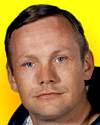 (source)
(source)
|
Neil Armstrong
(5 Aug 1930 - 25 Aug 2012)
American astronaut who was the first man to walk on the moon.
|
Science Quotes by Neil Armstrong (13 quotes)
Here men from the planet Earth first set foot upon the Moon July 1969, A.D. We came in peace for all mankind.
— Neil Armstrong
Plaque left on the moon, 20 Jul 1969.
Houston, that may have seemed like a very long final phase. The autotargeting was taking us right into a... crater, with a large number of big boulders and rocks ... and it required... flying manually over the rock field to find a reasonably good area.
— Neil Armstrong
…...
Houston, Tranquility Base here, the Eagle has landed.
— Neil Armstrong
First words transmitted from the moon (20 Jul 1969).
In flying, the probability of survival is inversely proportional to the angle of arrival.
— Neil Armstrong
Quoted in Richard H. Enns, George McGuire, Computer Algebra Recipes for Classical Mechanics (2003), 37.
In the next twenty centuries … humanity may begin to understand its most baffling mystery—where are we going? The earth is, in fact, traveling many thousands of miles per hour in the direction of the constellation Hercules—to some unknown destination in the cosmos. Man must understand his universe in order to understand his destiny. Mystery, however, is a very necessary ingredient in our lives. Mystery creates wonder and wonder is the basis for man’s desire to understand. Who knows what mysteries will be solved in our lifetime, and what new riddles will become the challenge of the new generation? Science has not mastered prophesy. We predict too much for the next year yet far too little for the next ten. Responding to challenges is one of democracy’s great strengths. Our successes in space can be used in the next decade in the solution of many of our planet’s problems.
— Neil Armstrong
In a speech to a Joint Meeting of the Two Houses of Congress to Receive the Apollo 11 Astronauts (16 Sep 1969), in the Congressional Record.
It suddenly struck me that that tiny pea, pretty and blue, was the Earth. I put up my thumb and shut one eye, and my thumb blotted out the planet Earth. I didn’t feel like a giant. I felt very, very small.
— Neil Armstrong
…...
Mystery creates wonder and wonder is the basis of man’s desire to understand.
— Neil Armstrong
In a speech to Congress (16 Sep 1969). This is part of a longer quote given on the Neil Armstrong Quotes page of this website, beginning “In the next twenty centuries….”
No matter when you had been to this spot before, a thousand years ago or a hundred thousand years ago, or if you came back to it a million years from now, you would see some different things each time, but the scene would be generally the same.
[Referring to the topography of the Moon.]
[Referring to the topography of the Moon.]
— Neil Armstrong
Co-author with Michael Collins, Buzz Aldrin, Edwin E. Aldrin, Grace Farmer (ed.) and Dora Jane Hamblin (ed.), First on the Moon(1970), 297.
Science has not yet mastered prophecy. We predict too much for the next year and yet far too little for the next ten.
— Neil Armstrong
In Address to Joint Session of Congress (16 Sep 1969). Printed in 'Transcript of Astronauts’ Addresses to Congress', New York Times (17 Sep 1969), 30.
That’s one small step for a man, one giant leap for mankind.
[Transmission received and heard as “That’s one small step for man… one giant leap for mankind.”]
[Transmission received and heard as “That’s one small step for man… one giant leap for mankind.”]
— Neil Armstrong
Said as he stepped onto the Moon at 10.56 (G.M.T) on July 21st 1969. However, this is often misquoted as “That’s one small step for man, one giant leap for mankind.” This was due to static during Armstrong's transmission to earth. The 'a' was left out of his statement, ruining the contrast he had made between one man 'a man' and all mankind 'man'. Quoted in Nature, 1974, 250, 451. Information on the frequent misuse of this quote is given in Paul F. Boller and John George (eds.), They Never Said it: A Book of Fake Quotes, Misquotes and Misleading Attributions (1989), 4-5.
The [Moon] surface is fine and powdery. I can kick it up loosely with my toe. It does adhere in fine layers like powdered charcoal to the sole and sides of my boots. I only go in a small fraction of an inch, maybe an eighth of an inch, but I can see the footprints of my boots and the treads in the fine sandy particles.
[First report, immediately after stepping on to the Moon and saying “That's one small step for (a) man; one giant leap for mankind.”]
[First report, immediately after stepping on to the Moon and saying “That's one small step for (a) man; one giant leap for mankind.”]
— Neil Armstrong
NASA web site. Also in David Michael Harland, The First Men on the Moon: the Story of Apollo 11 (2007), 461.
The view of the moon that we’ve been having recently is really spectacular. It fills about three-quarters of the hatch window, and of course we can see the entire circumference even though part of it is in complete shadow and part of it is in earthshine. It’s a view worth the price of the trip.
— Neil Armstrong
…...
We were very privileged to leave on the Moon a plaque ... saying, ‘For all Mankind’. Perhaps in the third millennium a wayward stranger will read the plaque at Tranquility Base. We’ll let history mark that this was the age in which that became a fact. I was struck this morning in New York by a proudly waved but uncarefully scribbled sign. It said, ‘Through you we touched the Moon.’ It was our privilege today to touch America. I suspect perhaps the most warm, genuine feeling that all of us could receive came through the cheers and shouts and, most of all, the smiles of our fellow Americans. We hope and think that those people shared our belief that this is the beginning of a new era—the beginning of an era when man understands the universe around him, and the beginning of the era when man understands himself.
— Neil Armstrong
Acceptance speech (13 Aug 1969), upon receiving the Medal of Freedom as a member of the first manned moon-landing mission. In James R. Hansen, First Man: The Life of Neil A. Armstrong (2005), 569.
Quotes by others about Neil Armstrong (4)
Whoopie! Man, that may have been a small one for Neil but that’s a long one for me.
(Commenting as the third man to step on the lunar surface, though of smaller stature, 5' 6", than Neil Armstrong.)
(Commenting as the third man to step on the lunar surface, though of smaller stature, 5' 6", than Neil Armstrong.)
Spoken as Commander of the Apollo 12 lunar landing (1969). In British Broadcasting Corporation, The Listener (1969), 82, 729. On the previous Apollo 11 landing, Armstrong's famous remark had been "one small step for [a] man, one giant leap for mankind." At 5' 6", Conrad was six inches shorter than Armstrong.
If our intention had been merely to bring back a handful of soil and rocks from the lunar gravel pit and then forget the whole thing, we would certainly be history's biggest fools. But that is not our intention now—it never will be. What we are seeking in tomorrow's [Apollo 11] trip is indeed that key to our future on earth. We are expanding the mind of man. We are extending this God-given brain and these God-given hands to their outermost limits and in so doing all mankind will benefit. All mankind will reap the harvest…. What we will have attained when Neil Armstrong steps down upon the moon is a completely new step in the evolution of man.
Banquet speech on the eve of the Apollo 11 launch, Royal Oaks Country Club, Titusville (15 Jul 1969). In "Of a Fire on the Moon", Life (29 Aug 1969), 67, No. 9, 34.
I didn’t really decide that I wanted to be an astronaut for sure until the end of college. But even in elementary school and junior high, I was very interested in space and in the space program. I had both male and female heroes. One was a high school science teacher who was very important in encouraging me to pursue science. Because I was a tennis player, Billie Jean King was a hero of mine. And the early astronauts, John Glenn and Neil Armstrong, were heroes of mine as well.
Interview conducted on Scholastic website (20 Nov 1998).
Neil and Buzz, I am talking to you by telephone from the Oval Office at the White House, and this certainly has to be the most historic telephone call ever made. Because of what you have done, the heavens have become a part of man’s world. As you talk to us from the Sea of Tranquility, it inspires us to redouble our efforts to bring peace and tranquility to Earth.
Speaking to the first astronauts while they were standing on the Moon (20 Jul 1969).
See also:
- 5 Aug - short biography, births, deaths and events on date of Armstrong's birth.
- Neil Armstrong - context of quote “One small step” - Medium image (500 x 250 px)
- Neil Armstrong - context of quote “One small step” - Large image (800 x 400 px)
- Neil Armstrong - context of quote “Probability of survival” - Medium image (500 x 250 px)
- Neil Armstrong - context of quote “Probability of survival” - Large image (800 x 400 px)
- First Man: The Life of Neil A. Armstrong, by James R. Hansen. - book suggestion.
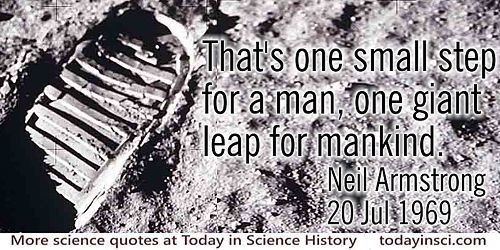
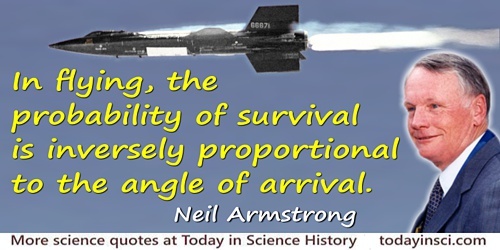
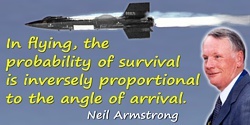
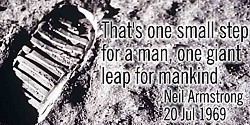
 In science it often happens that scientists say, 'You know that's a really good argument; my position is mistaken,' and then they would actually change their minds and you never hear that old view from them again. They really do it. It doesn't happen as often as it should, because scientists are human and change is sometimes painful. But it happens every day. I cannot recall the last time something like that happened in politics or religion.
(1987) --
In science it often happens that scientists say, 'You know that's a really good argument; my position is mistaken,' and then they would actually change their minds and you never hear that old view from them again. They really do it. It doesn't happen as often as it should, because scientists are human and change is sometimes painful. But it happens every day. I cannot recall the last time something like that happened in politics or religion.
(1987) -- 


